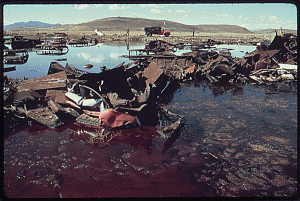The Oil Pollution Act of 1990 (OPA) and Section 311 of the Clean Water Act (CWA) are the primary federal programs for responding to oil spills. These laws impose strict liability for on owners or operators of vessels and facilities for the cleanup discharges oil into navigable waters of the United States, adjoining shorelines, the waters of the contiguous zone, in connection with activities under the Outer Continental Shelf Lands Act or when the discharge may affect natural resources of the United States. If a discharge takes place from an abandoned facility or vessel, the owner immediately prior to abandonment could be liable. Responsible parties may also be liable for damages to natural resources and economic damages resulting from oil spills.
 The Environmental Protection Agency (“EPA”) is primarily responsible for regulating non-transportation-related facilities and responding to spills in inland waters while the U.S. Coast Guard is responsible for vessels and marine transportation-related facilities
The Environmental Protection Agency (“EPA”) is primarily responsible for regulating non-transportation-related facilities and responding to spills in inland waters while the U.S. Coast Guard is responsible for vessels and marine transportation-related facilities
OPA and CWA can also impose liability on owners or operators of onshore facilities that have storage tanks, pipelines and abandoned wells that impact surface waters. In addition, many states have adopted their own oil spill laws. These state and federal programs are in addition to the regulatory programs established for underground storage tanks.
As a result, during a due diligence review, it is important to assess potential current and historic liabilities that may be associated with abandoned oil processing or storage facilities even though those assets are no longer reflected on their books. Because of enhanced enforcement and the new Spill Prevention, Control and Countermeasure rules, owners of regulated facilities and purchasers should determine if Aboveground Storage Tanks (ASTs) must be equipped with secondary containment systems. Even where not required, secondary containment systems may be a best management practice for ASTs because of their location, such as near floor drains, to minimize the possibility that oil could be discharged into the environment.
Article 12 of the NY Navigation Law and Bulk Petroleum Storage Act are the principal sources of liability for oil spills in New York. We assist clients in resolving oil spill liability, compromising spill liens that may be asserted against property and filing reimbursement applications with the New York State Oil Spill Fund and also applying for reimbursements.
Click on this link to more information about NYSDEC’s oil spills program.
Visit our Resource page for helpful links about this topic >
